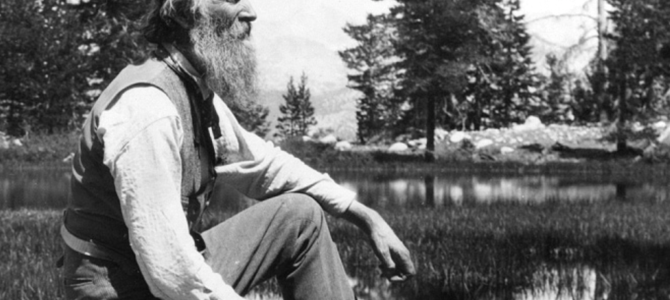
Want to get away from the civil strife that has torn the country apart as both the coronavirus pandemic and violent riots have turned America’s cities and cable news into a battlefield? If so, perhaps you think the ideal getaway might be a national park. There you can commune with nature and admire some of the most beautiful places in the world free from politics. Nope.
The idea that national parks could be a refuge from cancel culture’s obsession with rooting out what woke social media mobs and left-wing ideologues have labeled “white privilege” went out the window last week after the Sierra Club disavowed its founder, John Muir. In an essay portentously titled “Pulling Down Our Monuments” and published on its website, Michael Brune, the group’s executive director, effectively canceled Muir more than a century after his death in 1914.
The reason was that Muir, who was born in Scotland in 1838, had in some of his writings made disparaging remarks about Native Americans and African Americans. The offensive statements are contained in his voluminous published writing and correspondence.
While even a recent Sierra Club study of his embarrassing comments admitted his views were progressive for their time, he also used words that were hurtful even in context. He referred in his correspondence to surviving members of tribes that were largely exterminated by white settlers in California as “savages” — a term he also sometimes used to describe whites — as well as “dirty,” “garrulous as jays,” “superstitious,” “deadly,” “lazy,” and “wife stealing.” He also called blacks “dirty,” described their appearance in stereotypical terms, and claimed their “diseased and incurable dirt … [was] evidently chronic and hereditary.”
Although his sometimes-contemptuous attitudes toward both groups are indefensible, they were also not part of advocacy for discriminatory policies nor the main point of any cause he pursued. They merely document that Muir was a person of his time, however wrong.
In addition, Muir’s views of Native Americans evolved, and he ultimately regarded with sympathy their plight as a dispossessed and marginalized population, even if he was always more interested in the land than in the people who used to live there until they were driven out in the generation before he arrived in California.
Nor is there any evidence that he actively supported Jim Crow laws. At worst, he was a man of his time and someone more interested in trees, plants, rocks, and animals than in humans of any type.
National Parks Aren’t Racist
Long regarded as a saintly figure whose ideas about preserving nature’s wonders were deeply spiritual, Muir was the driving force behind the preservation of the Yosemite Valley and Sequoia National Park, as well as many other wild places in the western United States. He regarded these places as inherently valuable, as “temples” made not by human hands.
Muir considered the outdoors as “places for rest, inspiration, and prayers.” He deemed attempts to exploit them as sacrilege, and his essentially apolitical influence runs deep in the history of environmentalism.
All of that makes Muir a particularly problematic candidate for cancelation. His name graces dozens of sites in his adopted state of California, including schools, Muir Beach in Golden Gate National Park, and the Muir Woods National Monument, where his beloved redwoods stand. But the Sierra Club post has set off a torrent of news coverage that has condemned the national parks he helped create and the very idea of enjoying them as an expression of “whiteness.”
The assault on Muir’s legacy is merely an excuse to accuse yet another aspect of American life of institutional racism, as is demonstrated by articles about the controversy in the New York Times and the Los Angeles Times. These arguments build on prior attacks on environmentalism’s racist past. Those rebukes focus on the fact that many early Sierra Club members and Muir’s allies in the fight to create and preserve the national parks, such as Henry Fairfield Osborn and Madison Grant, were believers in the pseudo-science of eugenics.
The fashionable racist belief undergirding eugenics considered blacks, Native Americans, and non-Anglo-Saxon immigrants to the United States from Southern and Eastern Europe to be inferior people polluting the country with foreign habits and their Catholic and Jewish faiths. Muir was not connected with eugenics, but support for the practice bolstered a lot of that era’s supposedly high-minded initiatives, including the contraceptive and abortive efforts of Planned Parenthood founder Margaret Sanger.
Sierra Club Tries to Stay Relevant
Brune’s effort to disavow his organization’s founder and to assert that Muir’s stray racist comments “continue” to cause “harms” to minorities seems less a matter of genuine repentance and more an effort to be in tune with the Sierra Club’s largely leftist membership and to stay relevant in a conversation dominated by Black Lives Matter.
The Sierra Club’s clumsy proclamation of contrition is about the fact that it has had, as Muir intended, a narrow focus on nature stewardship rather than a broad leftist agenda. Brune’s pledge is not only to rid the group of white privilege by sending its staff down the bogus “White Fragility” rabbit hole of racism training, but also to align it with a broad “social justice” agenda on issues such as immigration. In the current moral panic about racism, no other course is open to those who wish to be woke enough to pass muster.
As such, Brune is also promising to transform the leadership of a group whose hundreds of thousands of contributors are overwhelmingly white liberals, into one in which “a majority of the team making top-level organizational decisions” at the club are “black, indigenous or other leaders of color.”
But there is more at stake in this discussion than the the Sierra Club’s awkward contortions to demonstrate its anti-racist bona fides. Those who want to transform environmentalism into an auxiliary of the Black Lives Matter movement are not making the Sierra Club nor the parks more minority-friendly. Rather, theirs is an attempt to depict the national parks Muir created as inherently racist and a product of “whiteness.”
Outdoor Recreation Is Not a ‘White Activity’
The New York Times article cited a study claiming that the low number of minorities visiting the national parks proves they are the product of institutional racism. Most lower-income minority Americans who live in urban areas are less likely to drive to the remote locations of many national parks. But the notion that such visits are prohibitively costly or exclusively white is absurd.
Driving to a park is generally not as expensive as, say, a trip to Europe. The parks cannot be moved to make them more accessible, even if those who don’t enjoy camping or park visits decided they do want to use them. Despite the New York Times’s repetition of the claim that outdoor recreation is a “white activity,” there is nothing intrinsically race-based about enjoying what Muir described as the spiritual elevation one derives from appreciating nature.
In the past, African Americans experienced the horrors of segregation at national parks the same as everywhere else. But the same study’s claim that blacks view parks such as Yosemite as inherently “unsafe” because “the outdoors” is connected to “lynchings and slavery-related flights” is plain ideological cant. Such far-fetched assertions have nothing to do with the real problems that blacks or any other ethnic group face.
Regardless of who chooses to visit the parks, Muir’s idea that preserving nature for future generations is a sacred obligation remains valid. The attempt to superimpose a dubious race-based agenda over the environmentalist cause of protecting natural wonders from exploitation has little to do with actual racism. It has everything to do with a political fashion that makes leftist groups like the Sierra Club particularly vulnerable to canceling.









